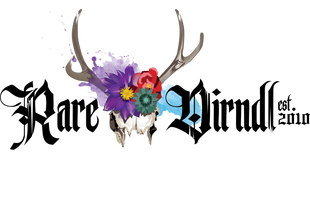A Ten Year History of the Modern Dirndl Dress
Since starting Rare Dirndl in 2010, as the founder and designer, I’ve had my pulse on the Dirndl and its trends. This presentation originally for the folks at the GAHC, dives into the topic of the modern dirndl design and how it has evolved over the past 10 years. From what is happening in Germany vs America to the differences in fabrications and sales avenues, I touch on all the relevant topics you'll want to hear about.
Disclosure: This information is based on personal experience and observation.

2009
In the US there are 2 manufactures of Dirndls and had a distinct style
- Ernst Licht - founded in 1968
- Polyester with embroidery
- Bergland Trachten - founded in 1986
- Cottons imported from Germany
- More conservative styles

In Germany there was a flood of new designers and larger manufactures creating more modern designs
- Krüger
- Angermeier
- CocoVero
- AlpenHerz
- Hammerschmid
- Kinga Mathe
- Lola Paltinger
- NohNee
American’s were not buying these dirndl dresses online
- No US shipping
- Prices ranged 400€ - 2500€
- Less trust in online shopping for clothing
2010
I founded Rare Dirndl
- Key differentiating designs: Off-the Shoulder Blouse (that stayed off the shoulder) Leopard Dirndl, new fabrications (satin, burnout, crinkle chiffon)

Kim Kardashian, Chris Jenner, & Paris Hilton go to Oktoberfest wearing Lola Paltinger Dirndls
- Very ornate
- Sexy
- Shorter styles

2011
Oktoberfest in Munich attendance surges to 6.9 million visitors
2013: Münchner Trachtentage
I was among many other German designers and gained experience and knowledge talking to German consumers. Key takeaways included:
- “What do American’s need a dirndl for”
- “Why would I buy American when I can buy German?”
Noticed a difference in the fabrics I was using vs what the German companies were using
- German: Cotton, silk, wool - more natural fibers
- Rare Dirndl: More variety including synthetic fibers
- Easier maintenance - minimal ironing
- Washable
- Easy for travel

2014 / 2015
- While Oktoberfest attendance numbers fluctuate the “You can’t go to Oktoberfest without a dirndl” idea begins to take hold
- German designers are coming out with Bridal styles and dirndls for special occasions
- Longer skirt lengths gain popularity - mid-calf
- More ornate fabrics - Jacquard & Damask (synthetic)

2017
Oktoberfest gains MAJOR momentum in the US
- It seemed like every brewery was hosting an Oktoberfest
- Larger Oktoberfests were seeing record numbers
More places and opportunities to purchase dirndl dresses
- German companies shipping to the US
- Amazon selling ‘fast fashion’ modern dirndls

2018 / 2019
- German Dirndl styles start to become more conservative
- Higher necklines
- Lace aprons
- Lace Blouses
- Buttons
- At home genetic testing gains popularity - more people seem to be getting in touch with their heritage.
- Online shopping becomes more normal


2020
- American market looking for a reason to wear a dirndl - no events - no Oktoberfest
- Everyday Dirndl (perfect for everyday wear)!

2021+
- Where is the dirndl going?
- I’ve always drawn on inspiration from not only trends, but also my own personal ideas, fabrics etc.
- Fashion shift - back to more ornate designs?
- post depression era flapper fashion
- post WWII the ‘new look’ etc
- The fashion industry will see it, but will the dirndl industry follow suit?
- Look at sustainability? Will designs and fabrications change
- Since they're not something you wash often, i don’t see this happening
- More focus on family history - keeping communities alive post pandemic

In the past decade a lot has changed in the dirndl industry both in the United States and in Germany. Watching styles change and forecasting trends is a major part of any fashion designers job, and the dirndl industry is no different. Trends have come and gone, migrated across the continents, and vary by region… but one thing remains the same. It is a staple garment at Oktoberfest and is very popular among German-American’s looking for ways to celebrate their heritage. I hope you enjoyed this journey with me from the most wild and ornate of designs of the 2010s to today’s popular, more demure and laid back styles.
–
Ever wonder which dirndl style you are? Click here to take our quiz and find out now!




